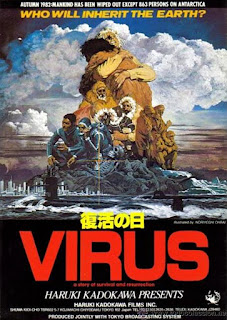Review of Virus (1980) Kinji Fukusaku's Apocalypse Epic
VIRUS-1980
DIRECTOR- KINJI FUKUSAKU
WHAT IS IT ABOUT?
-------------------------------------------------------
Starting off in 1983, the movie takes us straight to the aftermath of what the world has been through in 1982, the year the virus was unleashed as we follow a submarine on an expedition to Japan witnessing the entire population wiped out a fate shared by the rest of the world barring the Scientists working in Antarctica. And then in a flashback, we see the events leading up to it.
The ambitions of Virus are staggering. Reportedly the costliest Japanese production of its time, the story incorporates a global worldview to the spread of the Virus, and although Japan is featured, a significant portion is set in The US before finally shifting to Antarctica. The execution of this vision though doesn't always land and there are moments where it might feel overstuffed, and some of the narrative choices feels out of place. But the moments where its attempts land, they land so well that it pierces straight through your heart.
The two halves of the movie are vastly different stories and while they do justice to their respective halves, but when the switch occurs the sudden turn of events can take some time to get used to. Since the scope of the story is vast, so it stars an international cast, with a lot of the dialogues in English, but credit where its due as in mormal scenario, such an approach usually leads to bad dialogues but here they are quite well written and we have mostly a competent cast portraying it.
Glen Ford and Robert Vaughn as President Richardson and Senator Barkley respectively give some of the moments in the movie where the attempts at being profound properly land. Masao Kusakari as Dr. Yoshizumi is great as an understated lead, he never attempts to get the spotlight on him, and in that way manages to gradually come to the front of the story. But the backstory in Japan could definitely have been trimmed esp. that dealing with a nurse which goes on much beyond its effectiveness point.
This is quite a bleak movie, so if you are in the mood for getting entertained, this is definitely not the right choice for you. The cinematography with its toned down lighting and the camera capturing the vastness of the world amplified by it being empty, further adds to this sense of being left alone and the sheer ease with which humanity can be brought to its knees. And there is one particular scene where the discussion might get quite uncomfortable and though it might feel insensitive but considering the context of the situation it makes more sense, but then also it could have been handled better.
The movie is flawed and the final act calls for some huge suspension of disbelief, but the immensely satisfying closure it provides to the story, and the way it managed to emotionally connect with me, I can easily look past that for the closure it provides. Even though the premise of the doomsday story might not be anything new, but it's the execution that gives Virus its uniqueness as it takes the story and spins its own version out of it, and it is for that reason I will definitely be recommending it. Just make sure that you see the original Japanese version roughly at two and half hours, not the American cut that chops away roughly fifty minutes of the movie.
VERDICT- 7/10



Comments
Post a Comment